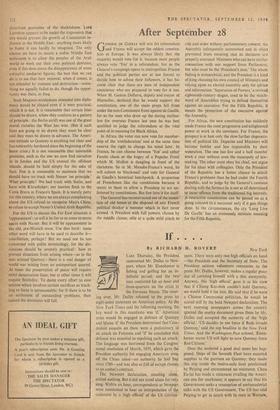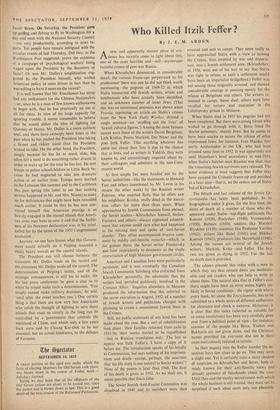If .
• •
By RICHARD H. ROVERE LAST Thursday, the President summoned Mr. Dulles to New- port, where Mr. Eisenhower is fishing and golfing for an in- definite period; and the two men conferred for an hour and three-quarters on the crisis in the Formosa Straits. The meet- ing over, Mr. Dulles released, to the press an eight-point statement on American policy. As the New York Times said the following morning, the key word in this manifesto was 'if.' American arms would be engaged in defence of Quemoy and yatsu 'if' the President determined that Com- munist assaults on them were a preliminary to an attack on Formosa and 'if' he concluded that defence was essential to repulsing such an attack. The language was borrowed from the Congres- sional resolution of March, 1955, which gave the President authority for engaging American arms off the China coast—an authority he had had since 1789—and was also as full of escape clauses as an author's contract.
The Newport declaration, standing alone, settled nothing. But it did not stand alone for very tong. Within an hour, correspondents at Newport were summoned to hear an interpretation of the statement by a 'high official' of the US Govern- New York ment. There were only two high officials on hand —the President and the Secretary of State. The President seldom volunteers comments to the press. Mr. Dulles, however, makes a regular prac- tice of covering himself with a thin anonymity. Anyway, this 'high official' gave it as his view that if Chiang Kai-shek couldn't hold Quemoy, we would hold it for him. He said that if he were a Chinese Communist politician, he would be scared stiff by the bold Newport declaration. The next morning newspapers across the country ignored the murky document given them by Mr. Dulles and accepted the authority of the 'high official.' US decides to use force if Reds invade Quemoy,' said the top headline in the New York Times. And the Washington Post echoed, 'Eisen- hower warns US will fight to save Quemoy from Red Chinese.'
Over the weekend a good deal more has hap- pened. Ships of the Seventh Fleet have escorted supplies to the garrison on Quemoy; they made this trip inside the twelve-mile limit proclaimed by Peiping and encountered no resistance. Chou En-lai has made a statement rivalling the Ameri- can one for murkiness; it appears to say that his Government seeks a resumption of ambassadorial talks with the US Government. The US has told Peiping to get in touch with its man in Warsaw, Jacob Beam. On Saturday, the President gave up golfing and fishing to fly to Washington for a day and meet with the National Security Council —not very productively, according to news re- ports. Yet people here remain intrigued with the peculiar events of last Thursday. Did they, as the Washington Post suggested, prove the existence of a campaign of 'psychological warfare' being waged upon the President by the Secretary of State? Or was Mr. Dulles's amplification sug- gested by the President himself, who wished American policy' to seem firmer in fact than he, was willing to have it seem on the record?
It is well known that Mr. Eisenhower has never had any enthusiasm for the Chinese Nationalists —or, since he is a man of few known enthusiasms to begin with, that he has practically no use at all for them. In view of his large capacity for ignoring trouble, it seems reasonable to believe that he would abhor the idea of fighting for Quemoy or Matsu. Mr. Dulles is a more militant soul, and there have certahlly been times in the past when he has pushed the President into taking a firmer and riskier stand than the President wished to take. On the other hand, the President, simply because he has let so much slide, has often felt a need to do something rather drastic in order to make up for the time he has-lost. He sent troops to police schoolchildren in Little Rock be- cause he had neglected to take less dramatic' action at an earlier time. Troops were hurried to the Lebanon this summer and to the Caribbean this past spring (the latter to see that nothing serious happened to Mr. and Mrs. Nixon) to make up for deficiencies that might have been remedied much earlier. It could be that he has now con- vinced himself that American prestige is so heavily engaged in the coastal islands that Ameri- can arms may have to save it and that the feeble- ness of his Newport declaration was, in his mind, called for by the terms of the 1955 Congressional resolution.
Anyway, no one here knows what this Govern- ment would actually do if Peiping mounted a really heavy assault on the coastal islands.
The President can still choose between the statement Mr. Dulles made on the record and the statement Mr. Dulles made off the record. The determination of Peiping's intent, and of the strategic consequences, is still his to make. (In his last press conference he gave a clue as to when he would make such a determination. 'You simply cannot make military decisions,' he said, 'until after the event reaches you.') One certain thing is that there are now very few Americans who relish the thought of fighting to save those islands that must so clearly in the long run be controlled by a government that controls the mainland of China, and which only a few years back were said by Chiang Kai-shek to be not essential, but an actual hindrance, to the defence of Formosa.



































 Previous page
Previous page